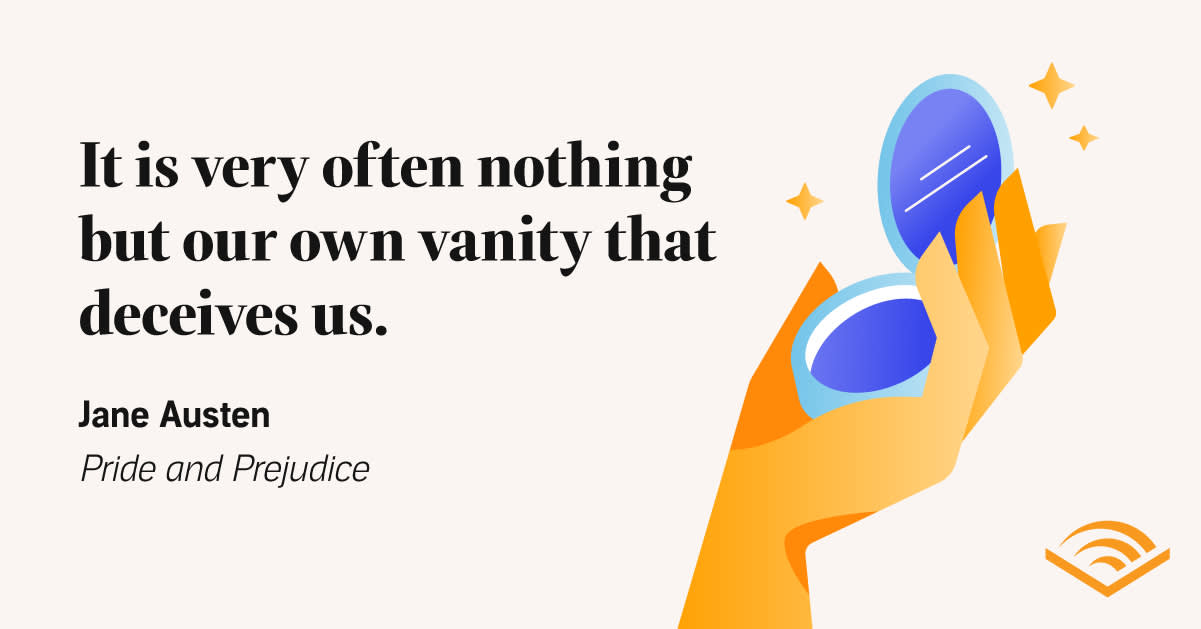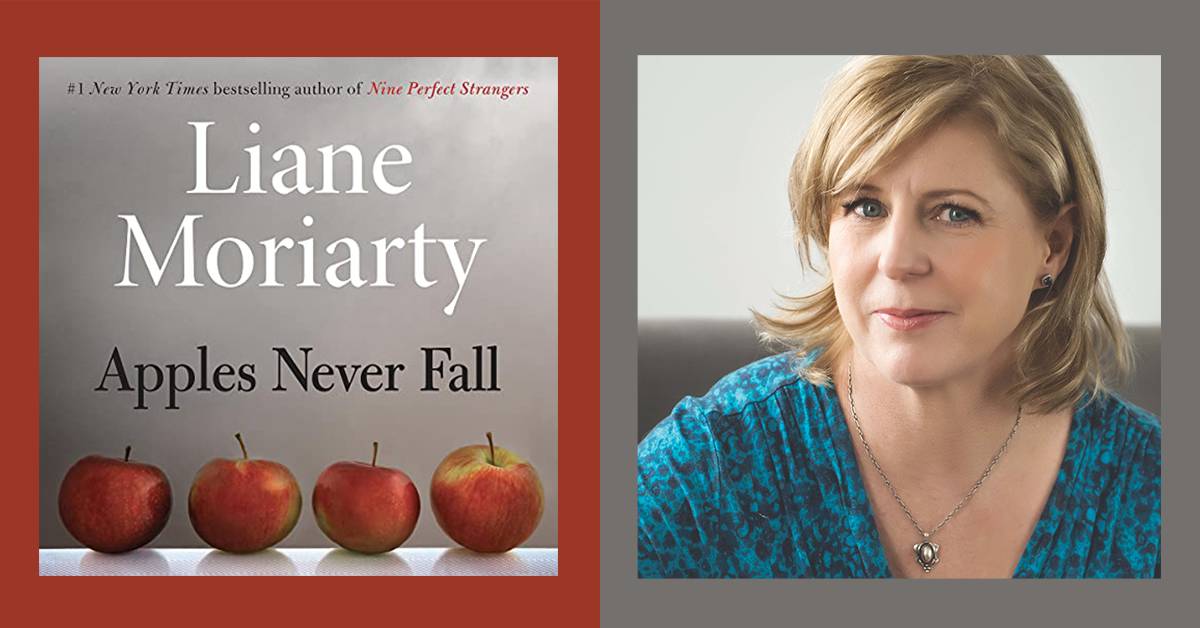Jane Austen’s beloved Pride and Prejudice first arrived more than two centuries ago, and it remains one of the most popular English novels to this day. This story of courage, inner strength, and the pursuit of true love has gained an avid fan base and inspired multiple film adaptations over the years.
Pride and Prejudice is universally cherished because it depicts people with real faults and feelings that stand in the way of their happiness. The characters develop and grow throughout the story as they overcome their preconceived prejudices about class, money, and reputation, and learn to see others without being clouded by their own vanity. To illustrate these concepts, here are some of the best quotes from Pride and Prejudice.
Quotes on Love and Marriage
Love is one of the main themes of Austen’s novel as the relationship between Elizabeth Bennet and Mr. Darcy develops from tense animosity to tentative romance. The novel fixates on the place of love in marriage, and even though it was written in 1813, these quotes offer useful advice for matters of love today.
1. “It is a truth universally acknowledged, that a single man in possession of a good fortune, must be in want of a wife.”
2. “To be fond of dancing was a certain step towards falling in love.”
3. “Next to being married, a girl likes to be crossed a little in love now and then. It is something to think of, and it gives her a sort of distinction among her companions.” - Mr. Bennet
4. “Do anything rather than marry without affection.” - Jane Bennet
5. “There are very few who have heart enough to be really in love without encouragement.” - Charlotte Lucas

6. “You showed me how insufficient were all my pretensions to please a woman worthy of being pleased.” - Darcy
7. “They walked on, without knowing in what direction. There was too much to be thought, and felt, and said, for attention to any other objects.”
8. “I think you are in very great danger of making him as much in love with you as ever.” - Elizabeth Bennet

9. “She began now to comprehend that he was exactly the man who, in disposition and talents, would most suit her. His understanding and temper, though unlike her own, would have answered all her wishes. It was an union that must have been to the advantage of both: by her ease and liveliness, his mind might have been softened, his manners improved; and from his judgement, information, and knowledge of the world, she must have received benefit of greater importance.”
10. “Could there be finer symptoms? Is not general incivility the very essence of love?” - Elizabeth Bennet
11. “Happiness in marriage is entirely a matter of chance.” - Charlotte Lucas
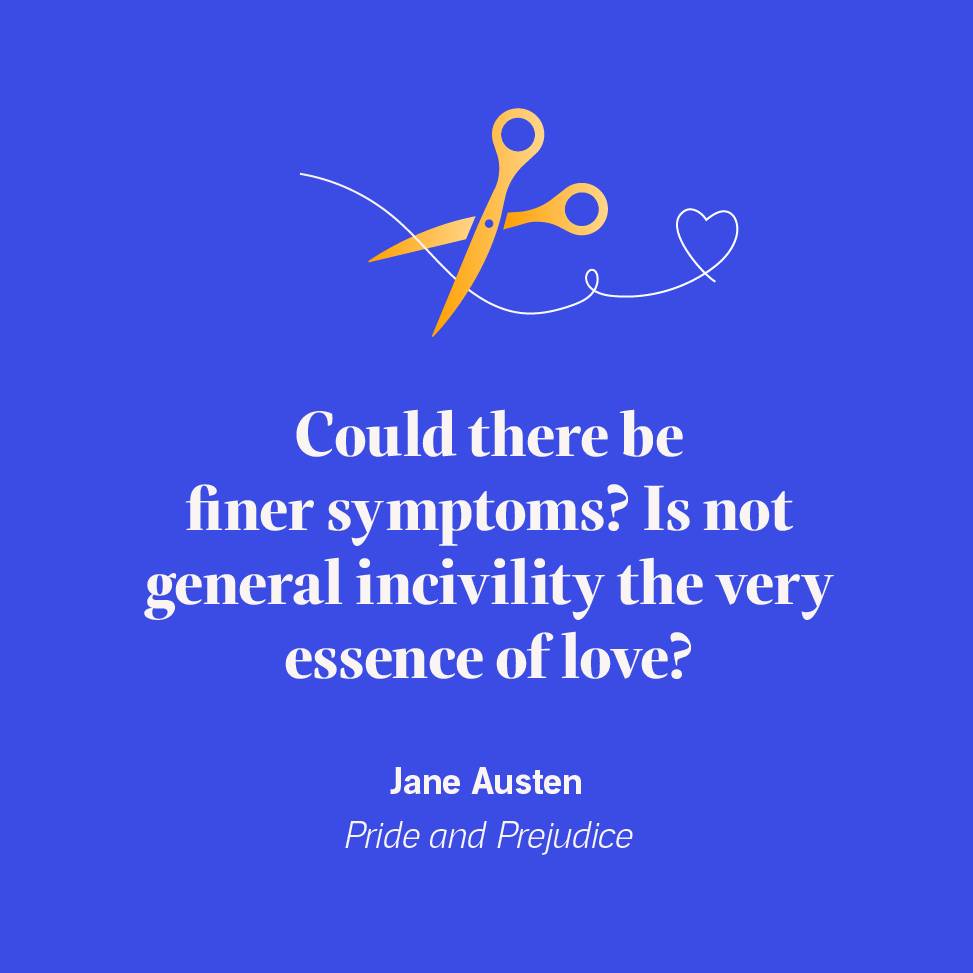
12. “I am determined that only the deepest love will induce me into matrimony. So, I shall end an old maid, and teach your ten children to embroider cushions and play their instruments very ill.” - Elizabeth Bennet
13. “In vain I have struggled. It will not do. My feelings will no longer be repressed. You must allow me to tell you how ardently I admire and love you.” - Darcy
14. “If a woman is partial to a man, and does not endeavour to conceal it, he must find it out." - Elizabeth Bennet
15. “In nine cases out of ten, a woman had better show more affection than she feels.” - Charlotte Lucas
16. “She hardly knew how to suppose that she could be an object of admiration to so great a man.”
17. "A lady's imagination is very rapid; it jumps from admiration to love, from love to matrimony in a moment." - Darcy

Quotes on Pride and Vanity
“Pride” and “prejudice” are more than just words to create a catchy title—they help illustrate the class and economic differences between the characters and how those are eventually overcome at the novel’s resolution. Take a look at these quotes if you need some moral inspiration.
18. “It is very often nothing but our own vanity that deceives us.” - Jane Bennet
19. “Yes, vanity is a weakness indeed. But pride—where there is a real superiority of mind, pride will be always under good regulation.” - Darcy
20. “Vanity and pride are different things, though the words are often used synonymously. A person may be proud without being vain. Pride relates more to our opinion of ourselves, vanity to what we would have others think of us.” - Mary Bennet

21. “Had I been in love, I could not have been more wretchedly blind. But vanity, not love, has been my folly.” - Elizabeth Bennett
22. “Nothing is more deceitful... than the appearance of humility.” - Darcy
23. “Pride is a very common failing... I am convinced that it is very common indeed; that human nature is particularly prone to it, and that there are very few of us who do not cherish a feeling of self-complacency on the score of some quality or other, real or imaginary.” - Mary Bennet

24. “There is, I believe, in every disposition a tendency to some particular evil—a natural defect, which not even the best education can overcome.” - Darcy
25. “He was the proudest, most disagreeable man in the world, and everybody hoped that he would never come there again.”
Quotes on Happiness
Happiness comes in many forms but is often tricky to attain. Pride and Prejudice deals with the idea of achieving overarching happiness in life, as well as the little things that can brighten one’s day. The honest advice in this novel about how to feel truly happy can benefit everyone.
26. “I am only resolved to act in that manner, which will, in my own opinion, constitute my happiness, without reference to you, or to any person so wholly unconnected with me.” - Elizabeth Bennet
27. “I am the happiest creature in the world. Perhaps other people have said so before, but not one with such justice.” - Elizabeth Bennet

28. “I declare after all there is no enjoyment like reading! How much sooner one tires of anything than of a book! When I have a house of my own, I shall be miserable if I have not an excellent library.” - Miss Caroline Bingley
29. “Affectation of candour is common enough—one meets with it everywhere. But to be candid without ostentation or design—to take the good of everybody's character and make it still better, and say nothing of the bad—belongs to you alone.” - Elizabeth Bennet

30. “She had a lively, playful disposition that delighted in anything ridiculous.”
31. “I never could be so happy as you. Till I have your disposition, your goodness, I never can have your happiness.” - Elizabeth Bennet
32. “Follies and nonsense, whims and inconsistencies do divert me, I own, and I laugh at them whenever I can.” - Elizabeth Bennet
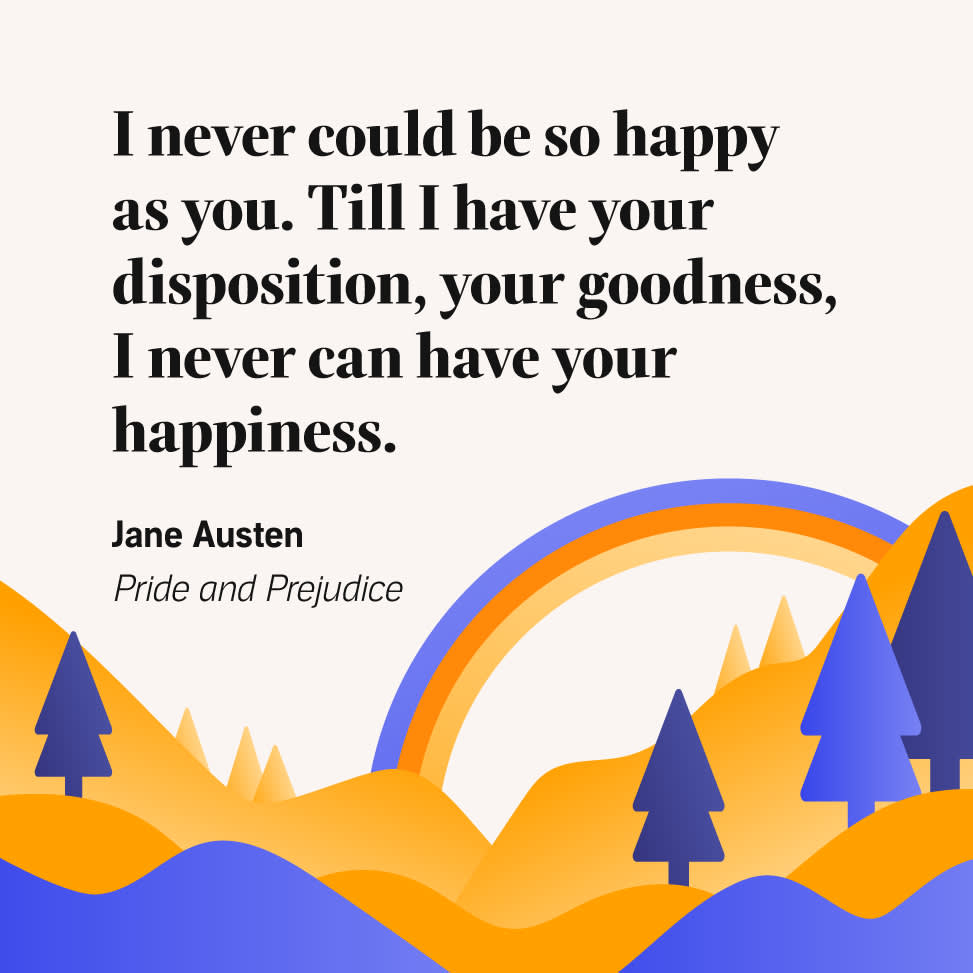
33. “You must learn some of my philosophy. Think only of the past as its remembrance gives you pleasure.” - Elizabeth Bennet
Quotes on Integrity
Elizabeth acts with integrity throughout the novel, and this is what makes her such a great protagonist. She sometimes makes decisions that may not seem like the best to other characters, but she stays true to her own standards of what it means to be a good person. Upholding your own moral principles is something we should all aspire towards.
34. “You shall not, for the sake of one individual, change the meaning of principle and integrity, nor endeavour to persuade yourself or me, that selfishness is prudence, and insensibility of danger security for happiness.” - Elizabeth Bennet
35. “There is a stubbornness about me that never can bear to be frightened at the will of others. My courage always rises at every attempt to intimidate me.” - Elizabeth Bennet
36. “Do you think that any consideration would tempt me to accept the man who has been the means of ruining, perhaps for ever, the happiness of a most beloved sister?” - Elizabeth Bennet
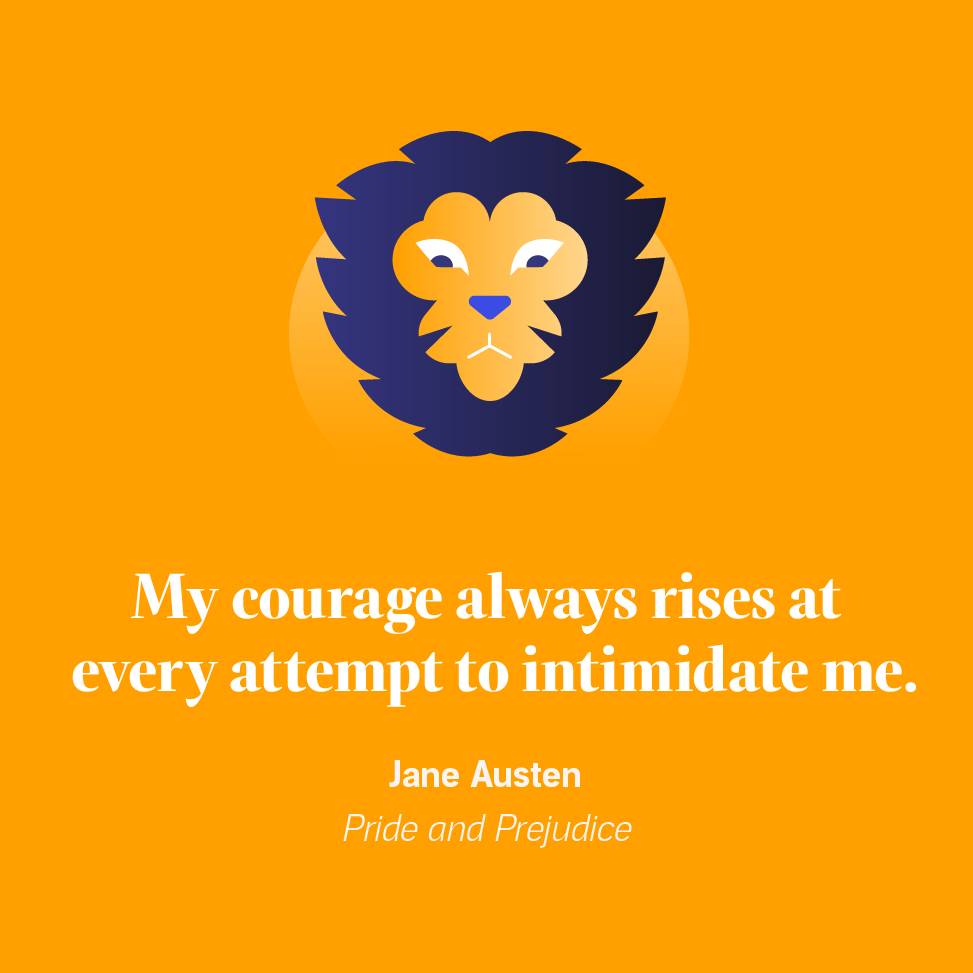
37. “Elizabeth had never been more at a loss to make her feelings appear what they were not. It was necessary to laugh, when she would rather have cried.”
38. “You were disgusted with the women who were always speaking and looking, and thinking for your approbation alone. I roused, and interested you, because I was so unlike them.” - Elizabeth Bennet
39. “It is particularly incumbent on those who never change their opinion, to be secure of judging properly at first.” - Elizabeth Bennet
40. “The more I see of the world, the more am I dissatisfied with it; and every day confirms my belief of the inconsistency of all human characters, and of the little dependence that can be placed on the appearance of merit or sense.” - Elizabeth Bennet

